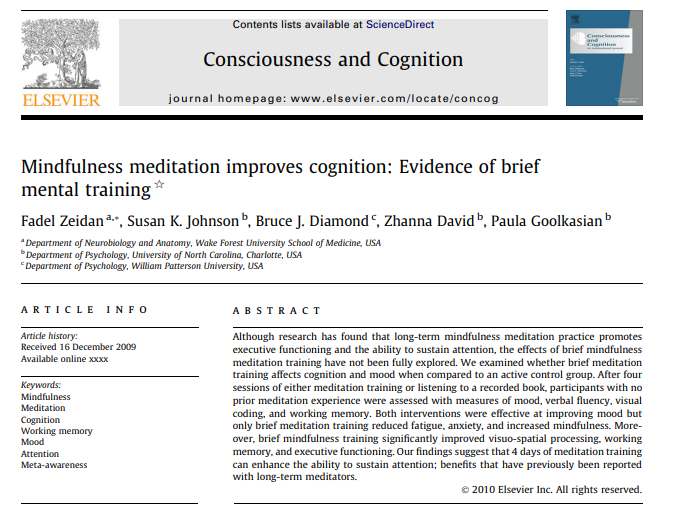Although research has found that long-term mindfulness meditation practice promotes executive functioning and the ability to sustain attention, the effects of brief mindfulness meditation training have not been fully explored. We examined whether brief meditation training affects cognition and mood when compared to an active control group. After four sessions of either meditation training or listening to a recorded book, participants with no prior meditation experience were assessed with measures of mood, verbal fluency, visual coding, and working memory. Both interventions were effective at improving mood but only brief meditation training reduced fatigue, anxiety, and increased mindfulness. Moreover, brief mindfulness training significantly improved visuo-spatial processing, working memory, and executive functioning. Our findings suggest that 4 days of meditation training
can enhance the ability to sustain attention; benefits that have previously been reported with long-term meditators.
Mindfulness meditation improves cognition: Evidence of brief mental training
Publication
Consciousness and Cognition
Abstract
Web and Email Links
Related Listings
Journal
Complementary Therapies in Medicine
Background Transcendental meditation (TM) is a stress reduction technique that can potentially lower blood pressure (BP) safely. The American Heart Association recommends that TM may be considered in clinical practice. Objective To provide an overview of all systematic reviews and meta-analyses of TM on BP for evidence-informed clinical decision making. Method Systematic searches of PubMed, EBSCOhost, Cochrane Library, Web of Science, Embase, and PsycINFO for all systematic rev […]
Journal
Nature
Social-evaluative stressors—experiences in which people feel they could be judged negatively—pose a major threat to adolescent mental health1,2,3 and can cause young people to disengage from stressful pursuits, resulting in missed opportunities to acquire valuable skills. Here we show that replicable benefits for the stress responses of adolescents can be achieved with a short (around 30-min), scalable 'synergistic mindsets' intervention. This intervention, which is a self-administere […]
Journal
Journal Alternative and Complementary Medicine
Objective: Mind–body practices that elicit the relaxation response (RR) have been demonstrated to reduce blood pressure (BP) in essential hypertension (HTN) and may be an adjunct to antihypertensive drug therapy. However, the molecular mechanisms by which the RR reduces BP remain undefined. Design: Genomic determinants associated with responsiveness to an 8-week RR-based mind–body intervention for lowering HTN in 13 stage 1 hypertensive patients classified as BP responders and 11 as n […]

